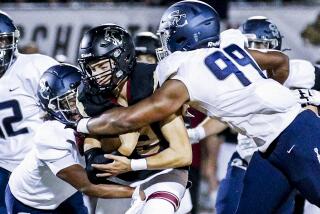Welch Claims He Is Being Denied His Due Process : Football: Canyon coach complains that his attorney will be out of town during his appeal of his year suspension.
- Share via
Canyon High football Coach Harry Welch, contesting a year suspension from coaching, claims that he is being denied due process, making the charge in a 45-page defensive brief that he says he will submit to the CIF Southern Section office Monday.
The Southern Section Executive Committee on June 21 approved Commissioner Stan Thomas’ recommendation to suspend Welch after an investigation determined that the Canyon football program had conducted a football practice May 7 in violation of section rules.
Welch’s appeal will be heard Tuesday in Cerritos by a three-member panel hand-picked by Thomas. All three are also members of the Executive Committee and Welch is concerned that he will not be given a fair hearing.
“I’m concerned that the panel will be forced into a conflict-of-interest situation,” Welch said. “That this panel is being asked to rule against itself.”
The brief, a copy of which was given to The Times on Friday, is written by Welch’s attorney, Stephen J. Tully. In it, Welch argues that his rights to due process, as guaranteed by Southern Section Rule 1106.4, have been denied by the section. The rule states that “. . . . any accused individual may be represented by a council (sic) of his/her choice and has the right to cross-examine witnesses and present evidence in his/her behalf.”
Welch wants Tully present at the appeal hearing but Tully cannot attend because he will be out of town Tuesday, according to the brief. Thomas has refused a postponement despite two requests by Tully in writing and said that he will not consider a postponement unless the William S. Hart Union High School District, of which Canyon is a member, requests one.
Thomas, reached in San Diego where he is attending the National Federation of State High School Assns. convention, said that he is not concerned with Tully’s requests for a continuance. Because Canyon is a voluntary member of the Southern Section, Thomas said, any argument on Welch’s behalf would have to come from the school district, and it is Welch’s employer who is responsible for contending the recommendation of the Southern Section.
“Harry Welch was invited (to the appeal hearing), his superintendent was invited and his principal was invited,” Thomas said. “That’s due process.”
Clyde Smyth, Hart district superintendent, indicated that he would not pursue a continuance. “The district is in no position to request a postponement. The district will show up on Tuesday morning,” he said. He added that if the appeal panel were to grant a continuance, the district would then seek legal advice.
In the brief, Tully also takes issue with the severity of the penalty for Welch.
A photograph in the May 19 issue of the Newhall Signal showed a Canyon football player hitting a blocking sled in the presence of several teammates and assistant coach Brian Stiman. The photograph was taken May 7.
Southern Section rules forbid football teams from practicing for longer than one class period from the end of the season until May 20. The rule also prohibits the use of sleds, blocking dummies and other football equipment.
Tully argues that Stiman’s presence at the time of the violation was unknown to Welch and, as a result, Welch should not be held personally responsible.
Thomas, however, said that Welch already has admitted guilt to him personally and that that admission is good enough to warrant the suspension.
Welch denies admitting that he committed a violation and has stated only that he is “responsible” for the Canyon High football program.
“What does he want me to do, take out his assistant coach?” Thomas said. “The purpose of this hearing is not to review his guilt or innocence. I have admissions of guilt from the coach, the principal and the superintendent.”
In the brief, Tully lists four instances in which a Southern Section coach received a one-year suspension. Included was an incident in 1987 when then-Hart basketball Coach Doug Michelson was suspended for hitting a referee.
Tully writes that each case involved “intentional conduct in which the coach who was penalized actively participated in a very serious violation.”
Thomas, however, refused to compare cases. His recommendation was made, he said, in large part because of the smoking gun--the photograph that indisputably shows a violation.
That “incident is enough (to warrant the one-year suspension),” Thomas said.
Tully also ascribes “absence of intentional conduct” by Welch in regard to the May 7 practice to a medical condition and three subsequent surgeries. He writes, “The effects of this problem on his energy level and his ability to devote full attention to the football program are obvious.”
“I want desperately to represent the Canyon Country community as football coach this year,” Welch said. “I will fight this as far as it is prudently and practically possible.”
More to Read
Get our high school sports newsletter
Prep Rally is devoted to the SoCal high school sports experience, bringing you scores, stories and a behind-the-scenes look at what makes prep sports so popular.
You may occasionally receive promotional content from the Los Angeles Times.






